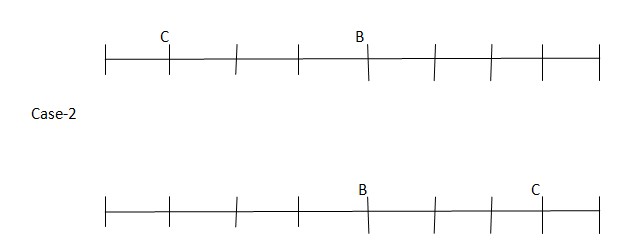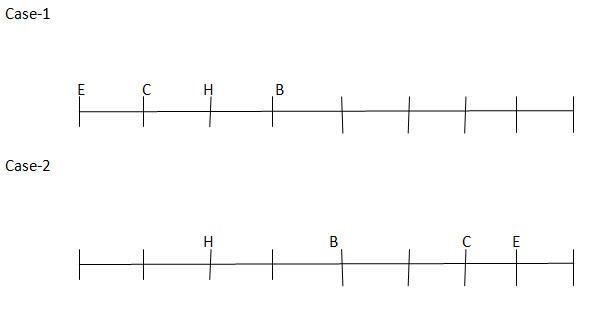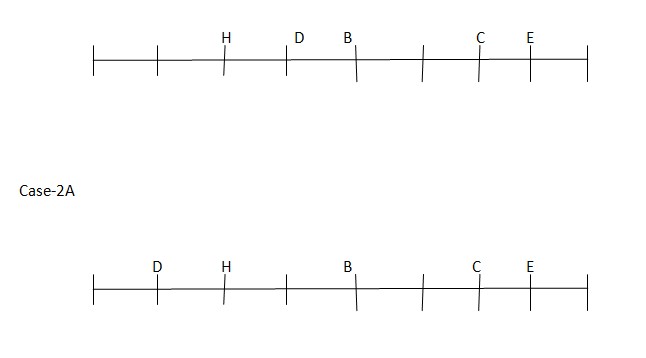Question
Who among the following sits fourth to the right of
H? Study the following information carefully and answer the given questions: There are nine persons i.e. A, B, C, D, E, F, G, H and I are sitting in a linear row. All of them are facing in the north direction. B sits at the middle of the row. Two persons sit between C and B. E is an immediate neighbour of C and sit at the end of the row. H sits third from the left end of the row. D is an immediate neighbour of H. Number of persons sit to the right of F is equal to the number of persons sit to the left of H. I sits exactly between B and F. At least one person sits between G and A who does not sit at the end of the row.Solution
B sits at the middle of the row. As per this statement, the arrangement will look like this:  Twopersons sit betweenCand B. Asperthisstatement,therearetwopossiblecases andthearrangementwill look like this:
Twopersons sit betweenCand B. Asperthisstatement,therearetwopossiblecases andthearrangementwill look like this:  EisanimmediateneighbourofCandsit at the end ofthe row. H sits third from the left end of the row.As per this statement, the arrangement will look like this
EisanimmediateneighbourofCandsit at the end ofthe row. H sits third from the left end of the row.As per this statement, the arrangement will look like this  DisanimmediateneighbourofH. Asperthisstatement, CASEII willfurthergetsplitintoone more case and the arrangement will look like this:
DisanimmediateneighbourofH. Asperthisstatement, CASEII willfurthergetsplitintoone more case and the arrangement will look like this:  Case-2
Case-2  NumberofpersonssittotherightofFisequalto the number ofpersonssit to theleft of H. IsitsexactlybetweenBandF. At least one person sits between G andAwho does notsitat theendoftherow. As per this statement, CASE I and CASE II will geteliminated and we will continue with CASE II (A) andthefinal arrangement will look likethis:
NumberofpersonssittotherightofFisequalto the number ofpersonssit to theleft of H. IsitsexactlybetweenBandF. At least one person sits between G andAwho does notsitat theendoftherow. As per this statement, CASE I and CASE II will geteliminated and we will continue with CASE II (A) andthefinal arrangement will look likethis: 
निम्नलिखित प्रश्न में , चार विकल्पों में से , उस विकल्प का च...
‘ सत्यनिष्ठ’ का विलोम कौन-सा है ?
' अनुरक्ति ' का विलोम शब्द क्या होगा ?
समस्या का विलोम शब्द होगा -
जो कभी मरता नहीं
अग्नि
Amount outstanding के लिए सही पारिभाषिक शब्द है ?
...NATURAL JUSTICE का आशय है
दिए गए शब्द का विलोम ज्ञात कीजिए।
संकुचित
दिए गए विकल्पों में से सार्थक शब्द ज्ञात कीजिए।
Relevant for Exams:



